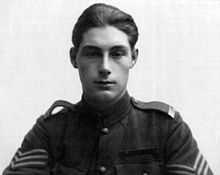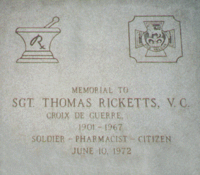Thomas Ricketts
| Thomas Ricketts | |
|---|---|
 | |
| Born | 15 April 1901 |
| Died | 10 February 1967 (aged 66) |
| Buried at | St. John's, Newfoundland |
| Allegiance | Newfoundland |
| Years of service | 1916 – 1919 |
| Rank | Sergeant |
| Unit | Royal Newfoundland Regiment |
| Battles/wars | World War I |
| Awards |
Victoria Cross Croix de Guerre (France) |
Thomas "Tommy" Ricketts VC (April 15, 1901 – February 10, 1967) was a Newfoundlander and recipient of the Victoria Cross, the highest and most prestigious award for gallantry in the face of the enemy that can be awarded to British and Commonwealth forces. He is the youngest army recipient in a combatant role, the two younger recipients being 15-year-olds Hospital Apprentice Andrew Fitzgibbon and Drummer Thomas Flinn (who despite strictly being a non-combatant, received his VC for hand-to-hand combat during the Indian Mutiny). The youngest naval recipient is Jack Cornwell, who was 16.
Victoria Cross
Ricketts, who was 17 years old and a private in the 1st Battalion, Royal Newfoundland Regiment during the First World War, performed the following on October 14, 1918, for which he was awarded the VC:
During the advance from Ledgehem the attack was temporarily held up by heavy hostile fire, and the platoon to which he belonged suffered severe casualties from the fire of a battery at point blank range. Private Ricketts at once volunteered to go forward with his Section Commander and a Lewis gun to attempt to outflank the battery. They advanced by short rushes while subject to severe fire from enemy machine guns.When 300 yards away, their ammunition gave out. The enemy, seeing an opportunity to get their field guns away, began to bring up their gun teams. Private Ricketts at once realized the situation. He doubled back 100 yards, procured some ammunition and dashed back to the Lewis gun, and by very accurate fire drove the enemy and their gun teams into a farm. His platoon then advanced without casualties, and captured four field guns, four machine guns and eight prisoners. A fifth field gun was subsequently intercepted by fire and captured. By his presence of mind in anticipating the enemy intention and his utter disregard for personal safety, Private Ricketts secured the further supplies of ammunition which directly resulted in these important captures and undoubtedly saved many lives.
After the war

(Water Street, St. John's, Newfoundland)
After the war, Ricketts studied Pharmacy, and opened a business on Water Street in St. John's. He was given a state funeral when he died in 1967, and is commemorated by a memorial on the former site of his pharmacy. Ricketts is buried at the Anglican Cemetery, Forest Road, St. John's, Newfoundland, Canada. Ricketts' medals are on display at the Canadian War Museum in Ottawa, Ontario, Canada.
Ricketts is sometimes erroneously considered a Canadian soldier, because Newfoundland was a self-governing dominion during World War I and did not become a Province of Canada until 1949.
Tributes
A play based on the life of Thomas Ricketts, entitled "The Known Soldier", was written by Jeff Pitcher and first performed by Rising Tide Theatre in Newfoundland in 1982. It toured the province of Newfoundland and Labrador in 2006.
External links
- Includes letters about Ricketts and a portrait
- Burial location of Thomas Ricketts "Newfoundland"
- News item "Thomas Ricketts' Victoria Cross donated to the Canadian War Museum"
- Legion Magazine article on Thomas Ricketts
- Thomas Ricketts at Find a Grave
|